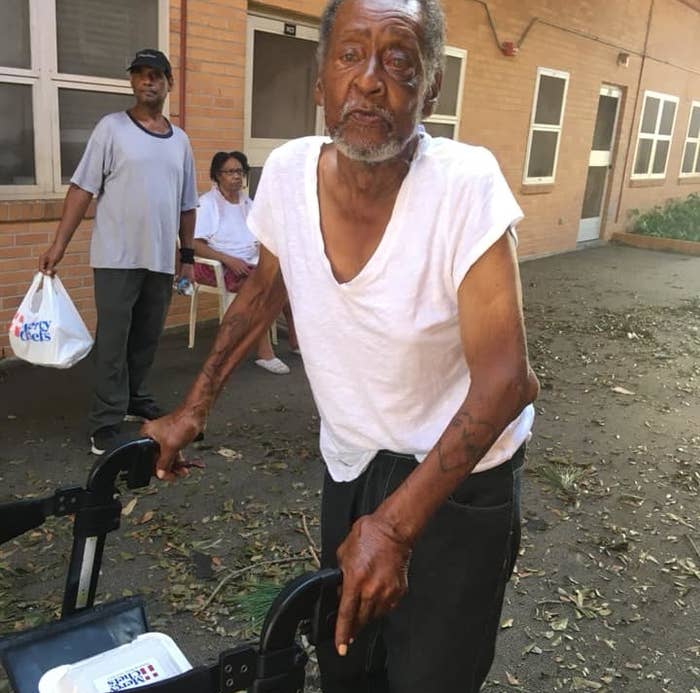
Two days after Hurricane Laura lashed Louisiana last month, President Donald Trump flew into the city of Lake Charles to tour the damage, making a stop at a National Guard armory to snap photos with rescue workers.
Unmentioned in the media coverage and photos of the event on Aug. 29 was the human disaster unfolding across the street at Golden Arms, a federally subsidized senior housing complex. There, in the oppressive heat and with no power and dwindling supplies of water, more than two dozen low-income residents, mostly Black, had been waiting more than 48 hours for help despite calls to 911 and other government agencies. Some of the residents were in wheelchairs whose batteries had run out. Some wore soiled diapers. At least one man, whose legs are paralyzed, couldn't leave his bed.
When residents saw the signs of the president’s impending visit — the security detail and the helicopter hovering overhead — they thought help had come at last.
“I thought it was for us,” Janice Chagois said. The 64-year-old with congestive heart failure who has lived at Golden Arms for three years said she slept on the ground outside her apartment for three nights after the hurricane hit, carefully rationing her food and water. She said she was stuck because she had no family to go to, and after her cellphone died, no way of summoning help.
“I nearly died from that,” Chagois added. “But they weren’t even thinking about us. They made sure he was safe,” she said of the president. “He probably didn’t even know we was there.”
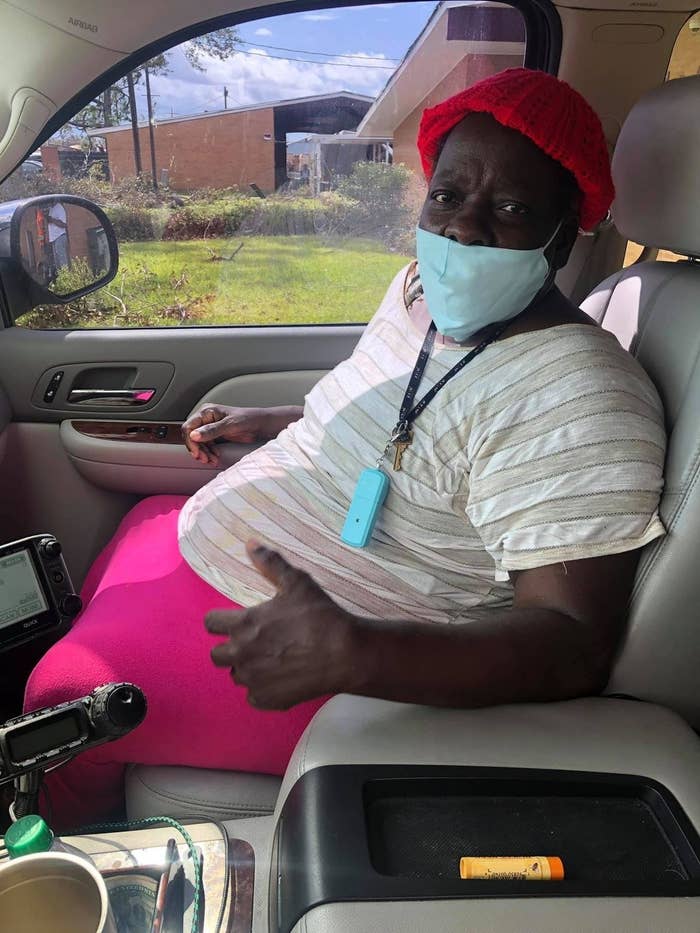
Most likely, he did not. The White House did not immediately respond to a request for comment. Volunteer rescue workers, who by that point had been working to get assistance for the residents, said they couldn’t get the attention even of their local government: “What’s crazy, Beth, is that the National Guard is right across the street from this complex and they’re not doing nothing and the president is right across the field and they’re not doing anything for these people. It’s crazy,” a volunteer rescue worker said in a Zello message to Beth Powell, a dispatcher with the volunteer group CrowdSource Rescue, at 12:40 p.m. on Aug. 29.
It was only one of the many failures involving residents of two federally subsidized senior housing projects — Golden Arms and Chateau Du Lac — in Lake Charles in the aftermath of the most powerful hurricane ever to strike the state. Dozens of distressed residents waited up to 72 hours for assistance, without food, water, or power, despite repeated requests for help.
Even more shocking, according to residents and volunteer rescue groups, a variety of federal, state, and local agencies essentially said their welfare was not their responsibility.
Ben Taylor, the director of the Lake Charles Housing Authority, which administers the federal funds that subsidize rents at both properties and directly runs Golden Arms, acknowledged that both facilities house older adults with disabilities, but said the homes are not, technically speaking, nursing homes. Despite their population of at-risk residents, the Department of Housing and Urban Development doesn’t require housing authorities and private owners of federally supported housing facilities to have evacuation plans, officials with multiple agencies told BuzzFeed News. They are not required, Taylor added, under Louisiana state policies either.
“All they had to do was call 911, and someone would have come and gotten them,” he said in a brief interview before hanging up. He did not return follow-up calls and messages.
But calling 911 didn’t work. Residents and volunteer rescuers said they called for help numerous times — but no one came.
Volunteers also called and went to other agencies directly, according to call logs reviewed by BuzzFeed News. They called the Lake Charles Police Department, the Lake Charles Fire Department, the Calcasieu Parish Sheriff’s Office, the Lake Charles Mayor’s Office, the Calcasieu Parish’s Office of Emergency Management, the Governor's Office of Homeland Security & Emergency Preparedness, the Federal Emergency Management Agency, and the National Guard.
In the 72 hours after Hurricane Laura struck, residents and volunteers made 80 calls to authorities seeking help at Golden Arms alone, records and interviews show, and about a dozen more concerning Chateau Du Lac.
“We had two people working the phones and we got absolutely nowhere,” Powell, the dispatcher with CrowdSource, told BuzzFeed News. “The police told us to call the sheriff. The sheriff told us to call the police. The emergency management office said they would look into it but never called me back. I even left a message for the governor’s office.”
BuzzFeed News reached out to all of these agencies for comment.
The Louisiana Governor’s Office of Emergency Management said that it assists parishes with mass evacuation events when local officials request that level of support and is not integrally involved with parish evacuation processes, noting that it is “not a first-responder agency. “The breakdown, if there is one, is at the local level" and the office does not have any information about the incident until an investigation is completed at the local level, said Mike Steele, spokesperson for the Office of Emergency Management.
A spokesperson for the Lake Charles mayor’s office said it was not responsible for the housing authority, because it “an independent agency” that was “not part of the City of Lake Charles." (The housing authority’s website indicates that the mayor appoints the commissioners who oversee the agency.)
Sgt. Denis B. Ricou, a spokesperson for the Louisiana National Guard, which was dispatched to the parish after the storm, said it was conducting an internal investigation into its response at Golden Arms but noted that the guard usually functions in a support role in conjunction with local officials.
FEMA, which primarily supports states financially after disasters, told BuzzFeed News to reach out to local authorities. "FEMA does not have a role in this investigation," a spokesperson said. "The investigation is actively being worked at the local level."
Officials at the Lake Charles Police Department, the Lake Charles Fire Department, and the Calcasieu Office of Homeland Security and Emergency Preparedness did not respond to requests for comment. Neither did Latter & Blum Property Management, which oversees Chateau Du Lac facility under contract with the housing authority.
The Calcasieu Parish Sheriff, after multiple requests for comment, said their officers had responded to calls at Golden Arms after the storm but refused to provide any further information without a formal request for public records. BuzzFeed News made such a request Wednesday morning but a response was not immediately provided.
Representatives from some of these agencies eventually did converge at Golden Arms. But even then, according to volunteers, they did not take charge of coordinating an evacuation because none of the residents, as vulnerable as they were, required immediate emergency treatment at a hospital.
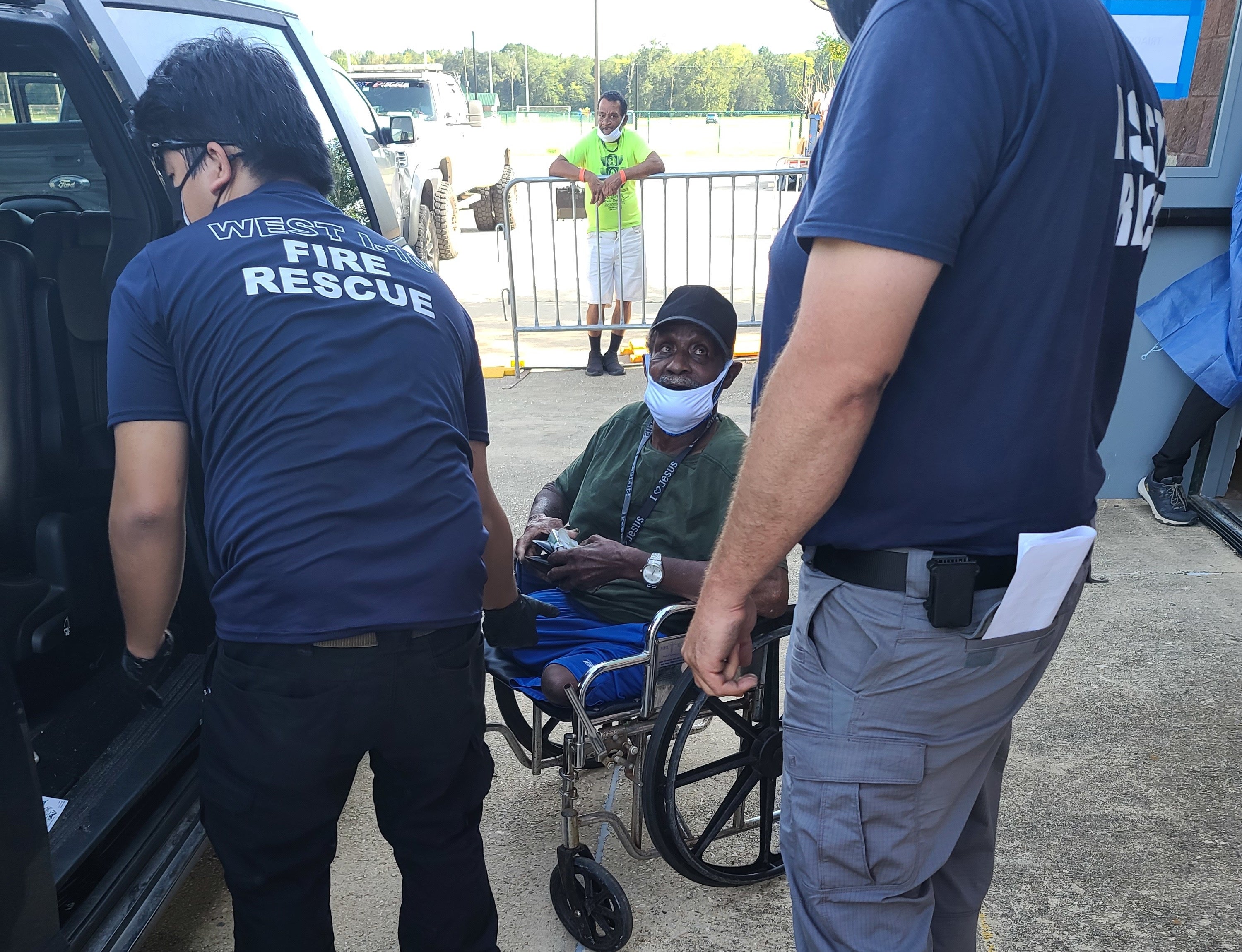
In the end, the National Guard helped evacuate those at Chateau Du Lac late on Aug. 27, about 20 hours after the hurricane made landfall, while a convoy of volunteers finally moved nearly 20 people from Golden Arms to shelters in the neighboring parishes of Metairie and Gonzales on Aug. 30.
BuzzFeed News interviewed more than a dozen residents and volunteers and reviewed scores of dispatch exchanges, voice memos, emails, photos, and cellphone logs to piece together the story of what happened at the two facilities. Taken together, they reveal a scene of chaos, bureaucratic dysfunction, and despair.
No one died or was seriously injured in those complexes in the aftermath of the hurricane. But the incident left many residents feeling traumatized. What’s more, experts say it underscores a gaping hole in the nation’s disaster response: The law does not require federally subsidized senior complexes, which often house older adults with disabilities who cannot afford nursing homes, to have evacuation plans. There are thousands of such buildings across the hurricane-prone Gulf Coast.
“Our disaster and response program is fundamentally broken,” said Sarah Saadian, a vice president for public policy at the National Low Income Housing Coalition. “We need to start over.”
Shannon van Zandt, an urban planning professor at Texas A&M University who specializes in low-income housing and disaster, said the incident underscores a need for a federal policy change requiring older adults in public housing to be part of mandatory evacuation plans. “It’s incredibly lucky that no one died in this incident,” she said. “Next time, it could be a lot worse.”
Paul Middendorf, a volunteer first responder with the group CrowdSource Rescue, came upon Chateau Du Lac almost by accident. It was 2 p.m. on the afternoon of Thursday, Aug. 27, about 14 hours after Hurricane Laura had made landfall. The rains had stopped, and the air had turned oppressively hot. Power was out across the city and Middendorf and another volunteer, Michelle Hempton, were driving through battered neighborhoods in Old Town handing out bottles of water to residents and trying to assess the damage. Coming down Ryan Street, Middendorf glanced left and noticed several older adults, some with wheelchairs and walkers, wandering around a courtyard filled with rubble.
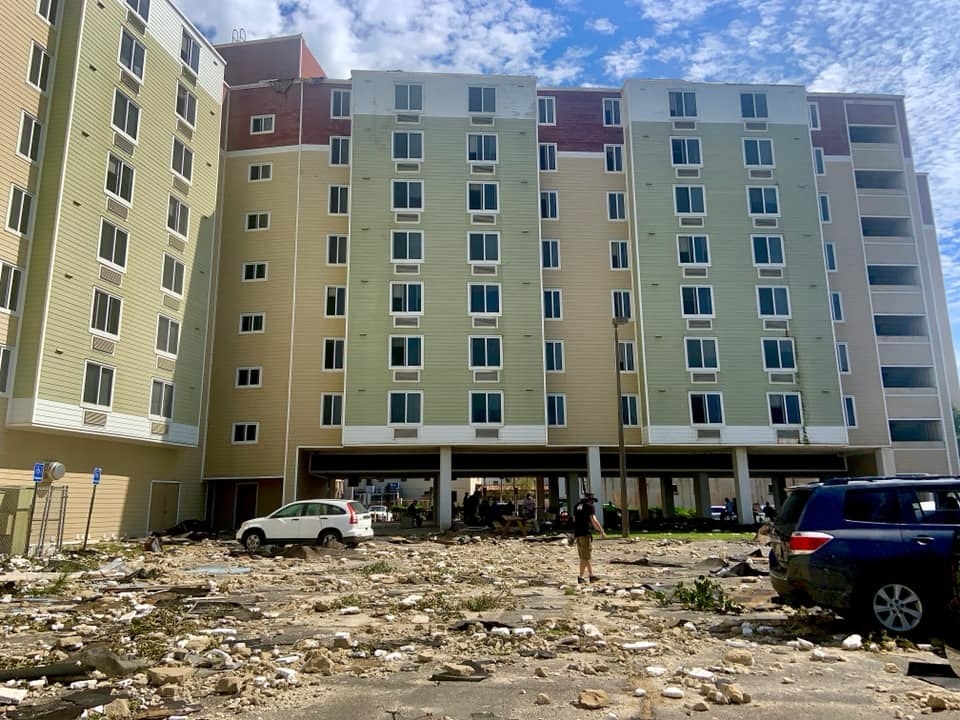
He and Hempton pulled their old Ford pickup into the driveway, got out, and were stunned to find even more older adults inside. He counted about 30 men and women, stuck in the hot, humid building, surrounded by debris and shattered glass. They were all hungry, thirsty, and alone. Walking through the dark foyer of the sweltering, eight-story building, they saw residents in sweat-stained, dirty clothes, sitting in wheelchairs and leaning on walkers. Many had dementia or other mental health and cognitive disabilities and kept asking for water. The elevators were broken, and Middendorf could hear people calling for help from their windows. The residents told them that the staff had left when the storm came barreling down. They hadn’t known how to evacuate, he said, and when they had called 911, no one had come.
It seemed to Middendorf, he later said, that the residents had “been left to die.”
“Whoever takes these people’s rent did not come for them,” he said. “No one came for them.”
Finally, Middendorf found a police officer passing by on the street, who, he said, promised to get help. But hours passed, and still no one came.
As the sun began to set, Middendorf, growing increasingly concerned, found and flagged down a group of volunteer firefighters who were passing by and enlisted them to help carry or guide the residents trapped on upper floors down to the ground.
At around this time, Ryan Nichols, a volunteer with another nonprofit organization, Rescue the Universe, was driving down Ryan Street past Chateau Du Lac, noticed the commotion and pulled over. He was astonished to see men coming out of the front doors carrying people in wheelchairs. When he and his team went inside, they found residents peeking out of their dark rooms. Inside one, a man with amputated legs was lying in his bed, unable to get up. The volunteer firefighters were scurrying around, knocking on doors, and guiding residents down hallways littered with broken glass from when windows had shattered in the storm.
After an hour or so, Nichols decided he needed to document the situation for his organization’s Facebook page. The video he posted shows him walking through a darkening courtyard as a woman screams at him from above. “Help! Help! I am in 702,” she cried. “I can’t get down!”
“They had no way to leave. No money, no cars,” Nichols said.
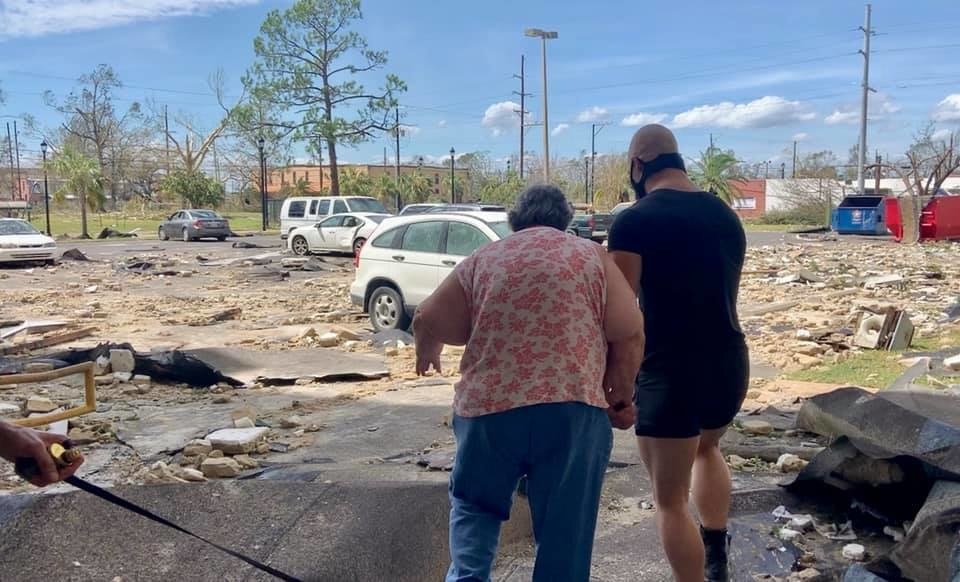
By 10:30 p.m., after nearly every resident had made it outside and a local news station had come to file a report on the fiasco, several buses operated by the National Guard rolled up. Members of the guard loaded the residents and drove them to shelters outside of Lake Charles.
The residents were finally safe. But amid the chaos, no one had kept a record of who was sent where. And that meant when the residents’ family members showed up to find them, no one knew where they were.
As the storm approached, Scott and Missy Folds had pleaded with Missy’s father, Craig Burney, to come to stay with them in Baton Rouge. Burney, 70, a proud man with a bad back and sharp wit, refused to leave his apartment at Chateau Du Lac. He didn’t want to abandon his good friend and neighbor, or the home where he had lived for three years.
Scott Folds said the family was worried about him, but staff at Chateau Du Lac had promised that the residents would be well cared for and that a generator was on hand to maintain power.
None of that proved true, and when Folds couldn’t reach his father-in-law in the 12 hours after the hurricane thrashed Lake Charles, he drove up there, only to discover Burney was missing.
“We talked to everyone — sheriff, National Guard — no one ever had an answer. They kept pointing us on to the next person when trying to find him,” he said. “You wouldn't treat animals like this. It’s a disgrace.”
Frantic, the Folds called the building management office, Latter & Blum, over and over. They’re still waiting for someone to return their call. Officials at Latter & Blum did not respond to emails from BuzzFeed News seeking comment; a woman who answered the phone at the management company promised to call back with a response, but never did.
Over that next week, Missy and Scott Folds drove to nine different shelters across the region, looking for Craig Burney. Finally, eight days after Laura struck, Missy Folds found her father at a Marriott hotel on Canal Street in New Orleans. Luckily, Burney is fine — his cellphone had died and he lost the charger and he hadn’t memorized his daughter’s number. Mentally, he’s a little shaken and still doesn’t understand why he and his neighbors were left behind.
“They lost them like luggage,” Folds said. “We didn’t know if he had died.”
By Aug. 29, Janice Chagois had been sleeping on the ground outside her apartment at Golden Arms for two nights. She said she felt if she didn’t get help soon, she might die. Her congestive heart failure has landed her in the ICU before, she said, it seemed as though her chest was starting to tighten in the same way it had then, heaving with each breath.
The storm was over, but she still felt terrified. All around her, trees had been ripped from the ground, roots and all, from the terrible winds. And even now that the air was calm, she still felt like she was in trouble.
On the first day, after her cellphone had died and help still hadn’t come, she got herself up, put on her mask, and pushed her walker across the street to the National Guard building the president would later visit.
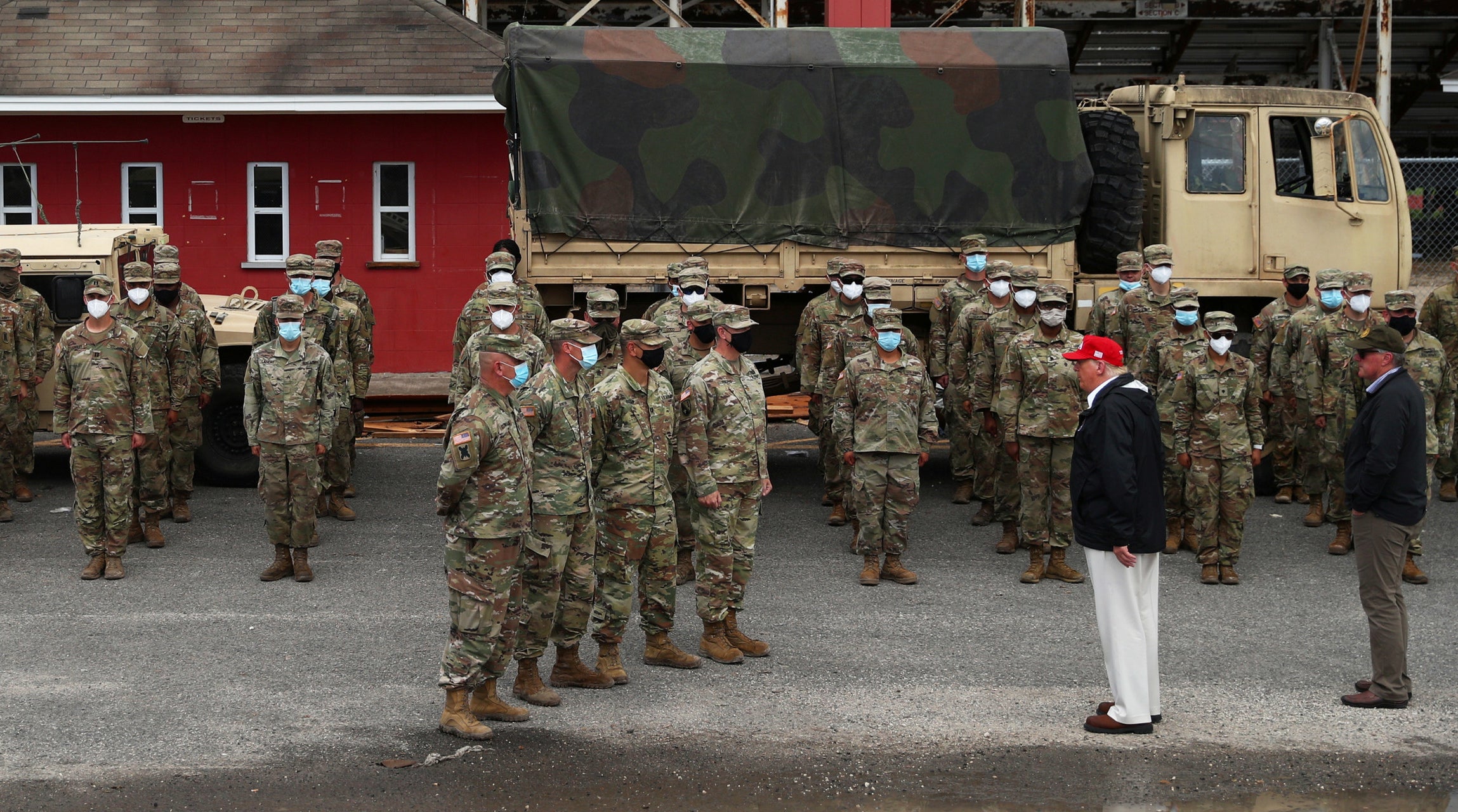
We still need help, she said she told them. More than 25 residents are stuck. Hours later and still without aid, she made the same trek again. That time, she said, members of the guard there told her they would call 911. Still, no one came.
Finally, another resident heard that busses were coming to take the residents to safety. A bus did come rumbling down the street toward them, Chagois said, but then it pulled into the armory and loaded up National Guard soldiers instead.
Chagois was thankful that she had a store of bottled water, which she shared with her 84-year-old neighbor to drink, brush their teeth, and wash their faces and bodies. But by the third day, she had to tell the woman that she couldn’t have anymore; they were running too low. Around her, fellow residents were starting to panic. Chagois said she wondered if they were being ignored because of their skin color: “We are Black. Why should they care? That’s the message they gave us.”
Nearly 48 hours after the hurricane hit, James Lea, a volunteer with the rescue group Aerobridge, was driving slowly through the neighborhood handing out water when he noticed an older man who looked exhausted standing in the shade.
The man told him there was “a really bad situation at an old folks home nearby,” Lea recalled.
Lea headed there and saw some residents were huddled outside, waiting with packed suitcases for someone to come get them.
Some, including Chagois, appeared to be in distress, their vitals low.
It was “hot as hell that day,” Lea recalled, and the smells from the sweltering rooms were overpowering.
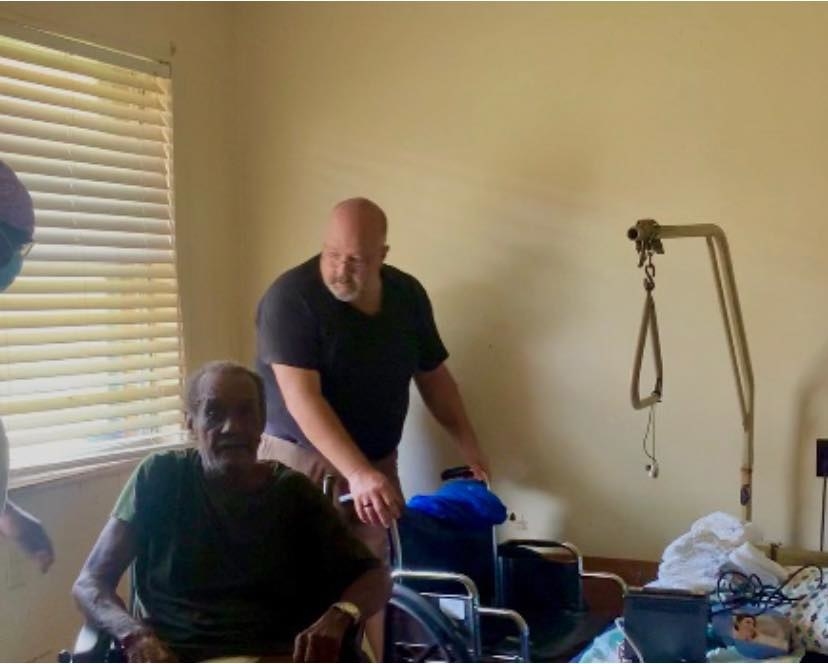
On the second floor of the low-slung, older brick building, they found a man whose legs are paralyzed and who had been sitting in his soiled diaper for two days.
As Chagois had done a day earlier, Lea crossed the street to the National Guard to ask for evacuation assistance. He said a supervisor assured him that they were aware of the situation and had “run it up the flagpole.”
But still, no help came, Lea said.
Afraid to leave the residents alone, Lea slept in his car outside of Golden Arms that night. In the morning, he drove to a volunteer staging area a few miles away to get pallets of water and food.
When he got back at around 10:30 a.m., he found a Calcasieu Parish sheriff's deputy, who informed him that President Trump would soon be arriving at the National Guard armory across the street, to meet with officials and then tour the devastated area.
Finally, around 5 p.m. that afternoon, a few hours after the president departed, representatives from multiple agencies arrived at Golden Arms. Pictures reviewed by BuzzFeed News show first responders, including the Lake Charles Fire Department, FEMA, and an ambulance service, standing beside downed trees and speaking to residents.
But still, the residents were not evacuated. Since none of the residents required immediate medical attention, the would-be rescuers left.
Yet again, the residents of Golden Arms had to spend the night in the hot darkness of their storm-shattered housing facility.
On the morning of Saturday, Aug. 30, three days after the storm, volunteers again began calling the governor’s office of emergency services trying to get buses to help evacuate the residents. Matt Marchetti, CrowdSource’s cofounder, said he made the bulk of those calls after arriving at the complex.
“The expectation was that when I explained the situation to one of the more senior agencies, they'd understand its urgency, and provide the resources needed,” he said. “Basically I get told that there is no support.”
Steele, the spokesperson for the governor’s emergency preparedness office, told BuzzFeed News that his office received multiple calls about the situation at Golden Arms. He said his office, in turn, called the Calcasieu Parish “to see if there was still a need for our resources to get them out.” But he said he did not know who state officials spoke to at the parish or what the outcome of the calls was.
He added that state officials had assisted parish officials with evacuations in advance of the storm, including sending buses to get people out of harm’s way. But he said he didn’t know whether buses were sent to senior housing complexes because that was a parish decision.
“I don’t have the details about these groups because it doesn’t start with us,” Steele said. “It gets up to us when there is a serious problem or need.”
Parish officials did not respond to multiple requests for comment sent via email.
By 11 p.m. on the night of Aug. 29, nearly 72 hours after the hurricane made landfall, the residents voted to let the volunteers load them into their own cars and drive them to safety.
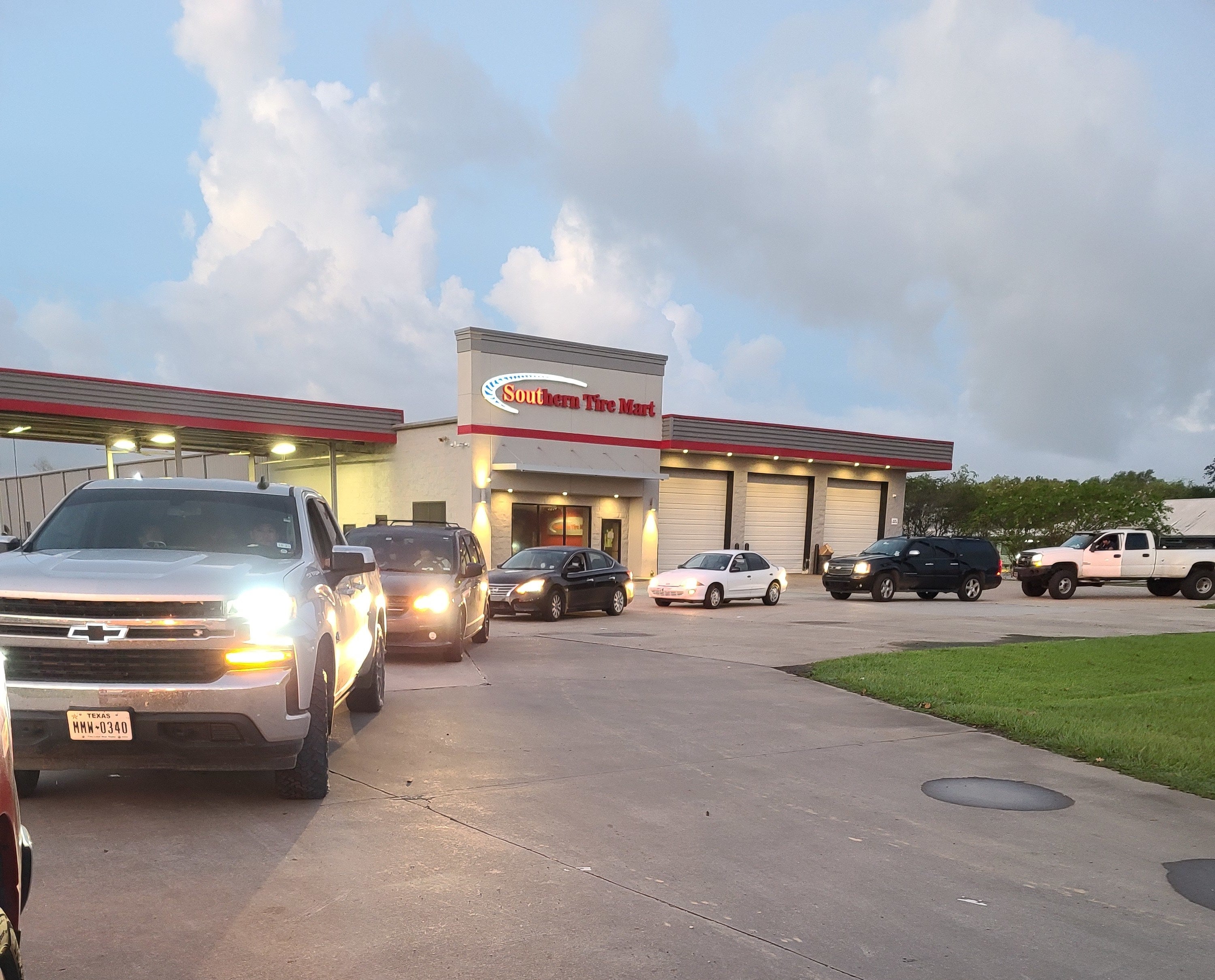
Even this was an ordeal. Without official evacuation assistance, the rescuers’ convoy of cars was turned away from one processing center at the Lake Charles airport, made a stop in a Walmart parking lot in Sulphur, Louisiana, and then finally arrived at a FEMA-run center in Metairie, about 200 miles away, around 11:30 a.m. on the morning of Aug. 30.
From there, Chagois said, she was taken to a shelter for those with medical needs in Gonzales.
It was a “tremendous journey to get to safety,” she said. Nearly a month later, she still feels traumatized. She’s still trying to secure temporary, emergency housing, having already been shuffled around to three different shelters. No one from Golden Arms or the Lake Charles Housing Authority has called her, she said.
Her hometown of Lake Charles and her state of Louisiana are both also still reeling from the storm. Power was out in many areas for weeks and Calcasieu Parish residents were told to boil their water before drinking it until this week. Meanwhile, several more storms have threatened the region.
“It’s taken so long to know if I can go back home,” Chagois said. “All I am is displaced, displaced, displaced. All I want to know is what is going to happen to me?”
On Wednesday, she called to say that she was back in Lake Charles, but in the hospital. She'd been admitted because she was having trouble breathing. "It's from the stress," she said. "It's just too much pressure for my heart to handle."